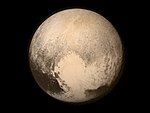2015 SO2
| Discovery | |
|---|---|
| Discovered by | Črni Vrh Obs. |
| Discovery date | 21 September 2015 |
| Designations | |
| 2015 SO2 | |
| Orbital characteristics[2][3][4] | |
| Epoch 31 July 2016 (JD 2457600.5) | |
| Uncertainty parameter 1 | |
| Observation arc | 342 days |
| Aphelion | 1.10688036 AU (165.586945 Gm) |
| Perihelion | 0.890962 AU (133.2860 Gm) |
| 0.99892124 AU (149.436491 Gm) | |
| Eccentricity | 0.108076 |
| 1.00 yr (364.66602 d) | |
| 208.3767° | |
| 0° 59m 13.937s / day | |
| Inclination | 9.1750° |
| 182.9293° | |
| 290.0678° | |
| Earth MOID | 0.0191611 AU (2.86646 Gm) |
| Physical characteristics | |
| 50–111 m[a][5] | |
| 23.9[2] | |
2015 SO2 (astronomical naming convention: 2015 SO2) is an Aten asteroid that is a temporary horseshoe companion to the Earth, the ninth known Earth horseshoe librator.[6] Prior to its most recent close encounter with our planet (2015 September 30) it was an Apollo asteroid.
Discovery
[edit]2015 SO2 was discovered on 21 September 2015 by B. Mikuž observing with the 0.6-m f/3.3 Cichocki telescope at the Črni Vrh Observatory in Slovenia.[7][8] As of 30 November 2015, it has been observed 84 times with an observation arc of 9 days.[2]
Orbit and orbital evolution
[edit]2015 SO2 is currently an Aten asteroid (Earth-crossing but with a period less than a year). Its semi-major axis (currently 0.999115 AU) is similar to that of Earth (0.99957 AU), but it has a relatively low eccentricity (0.108105) and moderate orbital inclination (9.181°). Gravitational interaction with Earth causes its orbit to change so that its average period is one year. It alternates between being an Aten asteroid and being an Apollo asteroid, changing dynamical status every 113 years approximately. As of 30 November 2015, this object is the 14th known Earth co-orbital and the 9th known object following a horseshoe path with respect to our planet. Its orbital evolution is characterized by alternating horseshoe and quasi-satellite episodes.[6]
Physical properties
[edit]With an absolute magnitude of 23.9, it has a diameter in the range of 50–111 meters (for an assumed albedo range of 0.04–0.20, respectively).[5]
See also
[edit]Notes
[edit]- ^ This is assuming an albedo of 0.20–0.04.
References
[edit]- ^ List Of Aten Minor Planets
- ^ a b c d "2015 SO2". JPL Small-Body Database. Jet Propulsion Laboratory. SPK-ID: 3728565. Retrieved 4 April 2016.
- ^ AstDys-2 on 2015 SO2 Retrieved 2015-11-28
- ^ NEODyS-2 on 2015 SO2 Retrieved 2015-11-28
- ^ a b "Asteroid Size Estimator". CNEOS NASA/JPL. Retrieved 16 February 2018.
- ^ a b de la Fuente Marcos, Carlos; de la Fuente Marcos, Raúl (2016). "From horseshoe to quasi-satellite and back again: the curious dynamics of Earth co-orbital asteroid 2015 SO2". Astrophysics and Space Science. 361 (1): 16. arXiv:1511.08360. Bibcode:2016Ap&SS.361...16D. doi:10.1007/s10509-015-2597-8. S2CID 189842725.
- ^ Discovery MPEC
- ^ News release
- Further reading
- Understanding the Distribution of Near-Earth Asteroids Bottke, W. F., Jedicke, R., Morbidelli, A., Petit, J.-M., Gladman, B. 2000, Science, Vol. 288, Issue 5474, pp. 2190–2194.
- A Numerical Survey of Transient Co-orbitals of the Terrestrial Planets Christou, A. A. 2000, Icarus, Vol. 144, Issue 1, pp. 1–20.
- Debiased Orbital and Absolute Magnitude Distribution of the Near-Earth Objects Bottke, W. F., Morbidelli, A., Jedicke, R., Petit, J.-M., Levison, H. F., Michel, P., Metcalfe, T. S. 2002, Icarus, Vol. 156, Issue 2, pp. 399–433.
- Transient co-orbital asteroids Brasser, R., Innanen, K. A., Connors, M., Veillet, C., Wiegert, P., Mikkola, S., Chodas, P. W. 2004, Icarus, Vol. 171, Issue 1, pp. 102–109.
- From horseshoe to quasi-satellite and back again: the curious dynamics of Earth co-orbital asteroid 2015 SO2 de la Fuente Marcos, C., de la Fuente Marcos, R. 2016, Astrophysics and Space Science, Vol. 361, Issue 1, article 16 (10 pp).
External links
[edit]- Discovery MPEC
- 2015 SO2 data at MPC
- Crni Vrh Observatory News
- Discovery image
- The 60-cm Cichocki Sky Survey Telescope
- 2015 SO2 at NeoDyS-2, Near Earth Objects—Dynamic Site
- 2015 SO2 at ESA–space situational awareness
- 2015 SO2 at the JPL Small-Body Database






